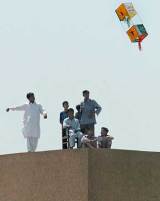Monday December 19

|

'The Pakistani Supreme Court has decided that the centuries-old pastime of kite-flying is too dangerous to be allowed to continue'
© Getty Images
|
|
Midway through Pakistan's innings today, a green-and-white kite appeared from the stands and started doing a loop-the-loop over the heads of the men in the middle. It fluttered, it buzzed, it swooped and it dived, as the Rawalpindi crowd - who are an easily pleased bunch - cheered its every movement.
Though the shadow was dancing harmlessly on the Bank Alfalah logo behind the wicketkeeper, the kite itself was doing its utmost to take centre stage. At one moment it plunged towards Andrew Flintoff's head as he plodded back to his bowling mark, prompting a quick grin and an exchange of shrugs with the non-striker, Inzamam-ul-Haq.
Eventually, however, the thermals that had been keeping the kite aloft dispersed, and it thudded to the turf in the region of third slip. A security guard instantly raced onto the pitch to snaffle the miscreant, and it can only be assumed that the kite-flyer himself cut his string and fled into the melee. Because never mind the Rawalpindi ground rules - the perpetrator had actually been breaking Pakistani state law.
In a move that is somewhat akin to the re-classification of bagpipes as an instrument of war, the Pakistani Supreme Court has decided that the centuries-old pastime of kite-flying is too dangerous to be allowed to continue. The ban was upheld in Lahore last week amid violent protests, which ironically resulted in dozens of people being admitted to hospital after police baton-charged the crowd.
It is the intensely competitive nature of the kite-flying that is the problem. The objective in a kite-duel is for one flyer to cut the string of the other, but in recent years the proliferation of nylon - and often glass-coated - strings has added a new dimension to the proceedings. According to one member of the Supreme Court, up to 30 people a year are killed or maimed in accidents involving kites, and last month a young girl died after having her throat slit as she passed on a motorcycle.
The case is to be reviewed in January, and regardless of the occasional tragedy, it is widely hoped that the status quo will be restored. Otherwise there could be an mass outbreak of lawlessness come the kite-flying festival of Basant, which is scheduled for February and March. At this time of year, the rooftops of Lahore come alive with a thousand dancing colours. But not for much longer, if the lawmakers have their way.
![]()
